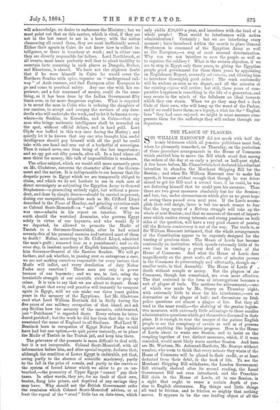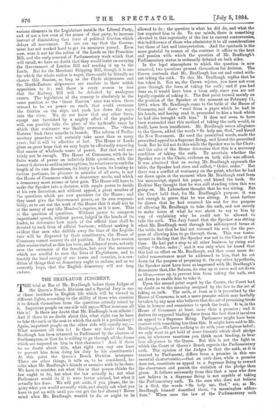THE PLAGUE OF PLAGUES.
SLR WILLIAM HARCOURT did not speak with half the ironic bitterness which all genuine politicians must feel, when he pleasantly remarked, on Thursday, on the perfection of those procedure arrangements in the House of Commons which enabled him to move the Bill which stood first among the orders of the day at so early a period as half-past eight. A few hours before, Mr. Chamberlain had declared his reluctant intention to abandon the Merchant Shipping Bill for the Session ; and when Sir William Harcourt rose to make his speech, it became evident enough that though he was deter- mined to get his Bill read a second time, if he could, he was not flattering himself that he could pass his measure. Thus there are two great measures absolutely lost for the Session ; and lost, too, under circumstances which give us no great hope of seeing them passed even next year. If the Lords accom- plish their evil design, there is but too much reason to fear that the long agony of a Reform struggle will take up the whole of next Session ; and that no measure of the sort of import- ance which excites strong interests and strong passions on both sides of the question, will have a very good chance of passing till the Reform controversy is out of the way. The truth is, as Sir William Harcourt intimated, that the whole arrangements of the Constitution appear to be expressly designed for the wasting of precious time. The House of Lords has become confessedly an institution which spends extremely little of its own time in wasting a great deal of the time of the House of Commons. And what the House of Lords does magnificently on the great scale, all sorts of minuter powers in the Commons do perseveringly and effectually, though on/ smaller scale, in that Assembly. The House of Lords death without scruple or mercy. But the plagues hi the Commons, though less sensational, are even more effective. The dust scattered in the form of interrogations becomes a sort of plague of boils. The motions for adjournment,—one of which was made by Mr. Storey on Thursday night, with extremely little to show for his interference,—are as destructive as the plague of hail ; and discussions on Irish police questions are almost a plague of lice. But they all tend to the same result,—the shelving of the greater legisla- tive measures, with extremely little advantage to these smaller administrative questions which get themselves discussed in their place. It is enough to sour the temper of the patient English people to see the conspiracy of events as well as of persons against anything like legislative progress. Here is the House of Lords about to waste one Session, and to insist on the coupling together of two distinct measures, which, if it were conceded, would most likely waste another Session. And here are Mr. Wartons, Mr. Ashmead-Bartletts, Mr. Storeys without number, who seem to think that every minute they waste of the House of Commons will be placed to their credit, or at least deducted from their debit, in the book of life. To see the Merchant Shipping Bill withdrawn, the London Government Bill virtually shelved after its second reading, the Local Government Bill not even introduced, and the Franchise Bill slain in the House of Lords, all in one Session, is a sight that ought to rouse a certain depth of pas- sion in English electorates. Big things and little things all tend to friction, and to friction so mighty that nothing moves. It appears to be the one leading object of all the
various elements in the Legislature outside the Liberal Party, and of not a few even of the atoms of that party, to increase instead of diminishing that force of political friction which delays all movement. No one can say that the Govern- ment has not worked hard to get its measures passed. Even now, were it not for the action of the Lords on the Franchise Bill, and the early renewal of Parliamentary work which that will entail, we have no doubt that they would insist on carrying the Government of London Bill and sending it up to the Lords. But for the Merchant Shipping Bill, though it is one for which the whole nation is eager, there could be literally no chance this Session, so long as the Clyde shipowners and the North-Eastern shipowners are resolute in their selfish opposition to it ; and there is every reason to fear that the Railway Bill will be defeated by analogous causes. The legislation of the country is absolutely in the same position as the ' Great Eastern ' once was when there seemed to be no power on earth that could overcome the friction on the slips, and push her down the ways into the river. We do not know that any other force, except one furnished by a mighty effort of the popular will, can possibly take the place of the hydraulic rams by which that resistance was finally overcome. The Great Eastern' took three months to launch. The reform of Parlia- mentary procedure will certainly take more than as many years ; but it will be effective at last. The House of Lords gives us great hope that we may begin by effectually removing that source of wholesale waste of power. But that will cer- tainly not be enough. The House of Commons, with its in- finite waste of power on infinitely little questions, with the favour it shows to sudden interruptions, its reluctance to curb the length of its own discussions, its lenity to bores, its leaning to furious partisans, its pleasure in minutim of all sorts, is not the House of Commons which a democracy needs, and which a democracy must sooner or later gain. The House will have to make the Speaker into a dictator, with ample power to decide at his own discretion, and without appeal, a great number of the questions which are now questions for the House ; and they must give the Government power, on its own responsi- bility, so to cut out the work of the House that it shall not be at the mercy of any idle Member's caprice, as it is now. This is the question of questions. Without power to compress impertinent speech, without power, lodged in the hands of its leader, to determine how much of the official time shall be devoted to each item of official business ; without making it evident that men who dribble away the time of the Legisla- ture will be disgraced by their constituents, the House of Commons cannot recover its old position. For to have session after session wasted as this has been, and delays of years, not only over the extension of the franchise, but over the measures which are needful to save the lives of Englishmen, and to fructify the local energy of our towns and counties, is a con- dition of things that no democracy ought to endure, and as we earnestly hope, that the English democracy will not long endure.











































 Previous page
Previous page